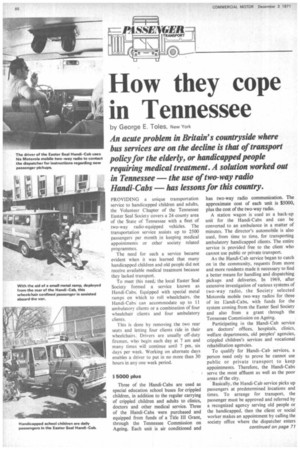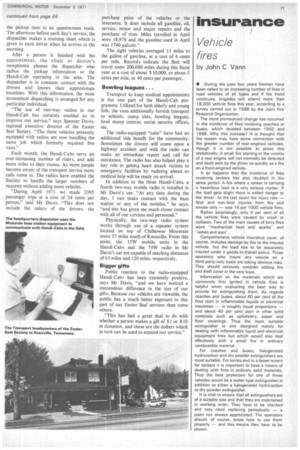How they cope in Tennessee
Page 68

Page 73

If you've noticed an error in this article please click here to report it so we can fix it.
by George E. Toles, New York
An acute problem in Britain's countryside where bus services are on the decline is that of transport policy for the elderly, or handicapped people requiring medical treatment. A solution worked out
IN in Tennessee — the use of two-way radio Handi-Cabs — has lessons for this country.
PROVIDING a unique transportation service to handicapped children and adults, the Volunteer Chapter of the Tennessee Easter Seal Society covers a 24-county area of the State of Tennessee with a fleet of two-way radio-equipped vehicles. The transportation service assists up to 2500 passengers per month in keeping medical appointments or other society related programmes.
The need for such a service became evident when it was learned that many handicapped children and old people did not receive available medical treatment because they lacked transport.
To meet this need; the local Easter Seal Society formed a service known as Handi-Cabs. Equipped with special metal ramps on which to roll wheelchairs, the Handi-Cabs can accommodate up to 11 ambulatory clients or a combination of four wheelchair clients and four ambulatory clients.
This is done by removing the two rear seats and letting four clients ride in their wheelchairs. Drivers are usually off-duty firemen, who begin each day at 7 am and many times will continue until 7 pm, six days per week. Working on alternate days enables a driver to put in no more than 30 hours in any one week period.
$ 5000 plus
Three of the Handi-Cabs are used as special education school buses for crippled children, in addition to the regular carrying of crippled children and adults to clinics, doctors and other medical service. Three of the Handi-Cabs were purchased and equipped from funds of a Title HI Grant, through the Tennessee Commission on Ageing. Each unit is air conditioned and
has two-way radio communication. The approximate cost of each unit is $5000, plus the cost of the two-way radio.
A station wagon is used as a back-up unit for the Handi-Cabs and can be converted to an ambulance in a matter of minutes. The director's automobile is also used, from time to time, for transporting ambulatory handicapped clients. The entire service is provided free to the client who cannot use public or private transport.
As the Handi-Cab service began to catch on in the community, requests from more and more residents made it necessary to find a better means for handling and dispatching pickups and deliveries. In 1969, after extensive investigation of various systems of two-way radio, the Society selected Motorola mobile two-way radios for three of its Ilandi-Cabs, with funds for the system coming from the Easter Seal Society and also from a grant through the Tennessee Commission on Ageing.
Participating in the Handi-Cab service are doctors' offices, hospitals, clinics, welfare departments, old peoples' agencies, crippled children's services and vocational rehabilitation agencies.
To qualify for Handi--Cab services, a person need only to prove he cannot use public or private transport to keep appointments. Therefore, the Handi-C abs serve the most affluent as well as the poor areas of the city.
Basically, the Handi-Cab service picks up passengers at predetermined locations and times. To arrange for transport, the passenger must be approved and referred by a recognized agency serving old people or the handicapped. then the client or social worker makes an appointment by calling the society office where the dispatcher enters the pickup time in an appointment book. The afternoon before each day's service, the dispatcher makes a routeing sheet which is given to each driver when he arrives in the morning.
After a person is finished with his appointment, the clinic or doctor's receptionist phones the dispatcher who radios the pickup information to the Handi-Cab operating in the area. The dispatcher is in constant contact with the drivers and knows their approximate locations. With this information, the most economical dispatching is arranged for any particular individual. "The use of two-way radios in our Handi-Cab has certainly enabled us to improve our service," says Spencer Davis, regional executive director of the Easter Seal Society. "The three vehicles presently equipped with radios are now handling the same job which formerly required five vans."
Each month, the Handi-Cabs serve an ever-increasing number of riders, and add more miles to their routes. As more people become aware of the transport service more calls come in. The radios have enabled the Society to handle the larger numbers of requests without adding more vehicles.
"During April 1971 we made 2395 passenger trips at a cost of 34 cents per person," said Mr Davis. "This does not include the salary of the drivers. the purchase price of the vehicles or the insurance. It does include all gasoline, oil, service, minor and major repairs and the purchase of tires. Miles travelled in April were 18,978 and the gasoline used in April was 1740 gallons."
The eight vehicles averaged 11 miles to the gallon of gasoline, at a cost of 4 cents per mile. Records indicate the fleet will travel some 200,000 miles during this fiscal year at a cost of about $ 10,000, or about 5 cents per mile, or 40 cents per passenger.
Bowling leagues ...
Transport to keep medical appointments is but one part of the Handi-Cab programme. Utilized for both elderly and young folk, the vans additionally furnish transport to schools, camp sites, bowling leagues, food stamp centres, social security offices, etc.
The radio-equipped "cabs" have had an additional side benefit for the community. Sometimes the drivers will come upon a highway accident and with the radio can make an immediate report and call for assistance. The radio has also helped play a key role in getting heart attack victims to emergency facilities by radioing ahead so medical help will be ready on arrival.
In addition to the three Handi-Cabs, a fourth two-way mobile radio is installed in Mr Davis's car. "At any time during the day, I can make contact with the base station or any of the mobiles," he says, "and this has given me much closer contact with all of our savices and personnel."
Physically, the two-way radio system works through use of a repeater system located on top of Chilhowee Mountain some 27 miles south of Knoxville. From this point, the 15W mobile units in the Handi-Cabs and the 75W radio in Mr Davis's car are capable of reaching distances of 65 miles and 120 miles. respectively.
Bigger gifts Public reaction to the radio-equipped Handi-Cabs has been extremely positive, says Mr Davis, "and we have noticed a tremendous difference in the size of our gifts. Because our vehicles are viewable, the public has a much better exposure to this part of our Easter Seal services than some others.
"This has had a great deal to do with whether a person makes a gift of S 1 or $10 in donation, and those are the dollars which in turn can be used to expand our service."


































































































































